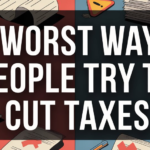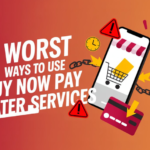Debt is something that almost everyone faces at some point in life. Whether it is a credit card bill, student loan, home loan, or personal loan, managing multiple payments can become stressful. If you don’t have a clear plan, the interest charges keep growing, and you may feel stuck in an endless cycle of payments.
According to financial surveys, an average household carries thousands of dollars in debt. But the good news is—debt can be managed smartly. With the right strategies, you can not only pay off your debt faster but also save a large amount of money that usually goes into interest.
In this blog, we will explain 5 effective tips that will save you from overwhelming debt. Each tip is supported with real-life examples and simple calculations so you can understand how to apply them to your financial situation.
5 Effective Tips That Will Save You from Overwhelming Debt

Tip 1: Pay More Than the Minimum
Many people make the mistake of paying only the minimum amount on their credit card or loan each month. While this avoids penalties, it traps you in debt for years because most of your payment goes toward interest, not the principal.
Why this works
Paying even a small amount extra every month directly reduces your principal balance. This means less interest is charged in the future, and you can become debt-free faster.
Example Calculation
Imagine you have a credit card balance of ₹50,000 with 15% annual interest.
- If you pay only the minimum of ₹1,000/month, it could take you 7 years or more to clear the balance, and you may pay ₹25,000+ in interest.
- If you pay ₹1,500/month instead, the loan could be cleared in around 4 years, saving you almost ₹10,000 in interest.
👉 Small increases in monthly payment create huge savings. Even if you add just ₹200–₹300 extra, it makes a big difference in the long run.
Tip 2: Choose a Repayment Strategy – Avalanche vs. Snowball
Paying more is important, but how you organize your payments matters too. Two of the most effective repayment strategies are:
1. Avalanche Method
- Focus on paying off the debt with the highest interest rate first.
- Pay minimums on all other debts.
- Once the highest-interest debt is cleared, move to the next.
This method saves you the most money in interest.
2. Snowball Method
- Focus on paying off the smallest balance first, regardless of interest.
- Once that is gone, move to the next-smallest debt.
This method gives you quick wins and keeps you motivated.
Example Comparison
Suppose you have three debts:
- ₹10,000 at 20% interest
- ₹5,000 at 12% interest
- ₹2,000 at 8% interest
Extra repayment available = ₹1,000/month - Snowball Method:
- Pay off ₹2,000 debt in 2 months.
- Then tackle ₹5,000, then ₹10,000.
- Advantage → psychological boost.
- Pay off ₹2,000 debt in 2 months.
- Avalanche Method:
- Focus on ₹10,000 (20% interest) first.
- Save more on interest overall, but progress feels slower.
- Focus on ₹10,000 (20% interest) first.
👉 Both methods are effective. If you want to save the most money, choose Avalanche. If you need motivation to stay consistent, go for Snowball.
Tip 3: Consolidate or Refinance Your Debt
Sometimes, managing multiple loans and credit cards is confusing. Consolidation helps you combine them into one single payment, often at a lower interest rate.
How It Works
- Debt consolidation loan: Take one loan at a lower interest rate to pay off all your debts.
- Balance transfer credit card: Shift your balance to a card offering 0% or lower promotional interest for a fixed period.
- Refinancing: If you already have a loan (like a home loan), refinancing at a lower interest rate can reduce your monthly burden.
Example Calculation
Let’s say you owe ₹50,000 across different cards, with an average interest rate of 18%.
- Monthly interest = ₹750.
- If you consolidate into a loan at 10%, your monthly interest drops to ₹417.
- Savings = ₹333/month, which you can use to pay extra toward the principal.
In just one year, that saves almost ₹4,000, and it shortens your repayment timeline.
⚠️ Caution: Always check for hidden fees, balance transfer charges, or collateral risks before consolidating.
Tip 4: Create and Stick to a Budget
A budget is your strongest weapon against debt. Without knowing where your money goes, you cannot control your finances.
Popular Budgeting Methods
- 50/30/20 Rule
- 50% of income → Needs (rent, food, bills)
- 30% → Wants (entertainment, shopping)
- 20% → Savings & Debt repayment
- 50% of income → Needs (rent, food, bills)
- Zero-Based Budget
- Every rupee you earn is assigned a purpose—nothing is left “unplanned.”
- Every rupee you earn is assigned a purpose—nothing is left “unplanned.”
- Envelope Method
- Allocate cash into envelopes for each category (groceries, transport, entertainment). When the envelope is empty, no more spending.
Example Budget
If your monthly income is ₹50,000:
- Needs (50%) → ₹25,000
- Wants (30%) → ₹15,000
- Savings/Debt (20%) → ₹10,000
Now, if you cut ₹3,000 from “wants” like dining out, you can add that to debt repayment. That’s ₹36,000 extra per year toward reducing debt!
👉 The secret is not just creating a budget, but sticking to it consistently.
Tip 5: Seek Professional Guidance and Use Tools
Sometimes, debt becomes too overwhelming to handle alone. In such cases, seeking professional help is a smart step.
Professional Help Options
- Credit Counseling Services: Experts help you create a realistic plan, negotiate with lenders, and sometimes reduce your interest rates.
- Debt Management Plans (DMPs): Combine multiple payments into one, often at reduced interest.
- Financial Advisors: Provide long-term strategies to prevent future debt.
Tools You Can Use
- Debt payoff calculators → See how long it will take to clear debt.
- Budgeting apps (like Mint or YNAB) → Track spending in real-time.
- Automated payment reminders → Prevent late fees and missed payments.
Mini Success Story
For example, a person with ₹1,00,000 debt at 16% interest joined a Debt Management Program. Their interest was reduced to 9%, and payments were reorganized. They managed to clear their debt in 3 years instead of 6, saving more than ₹25,000 in interest.
👉 Asking for help is not a weakness—it’s a wise financial move.
📌 Quick Summary Table – 5 Effective Tips That Will Save You from Overwhelming Debt
| Tip | Strategy | Key Benefit |
| 1 | Pay More Than the Minimum | Cuts principal faster, reduces interest |
| 2 | Avalanche or Snowball Method | Choose savings (avalanche) or motivation (snowball) |
| 3 | Consolidate or Refinance Debt | Lower rates, one payment, faster payoff |
| 4 | Create and Stick to a Budget | Frees up extra money for debt repayment |
| 5 | Seek Professional Help & Use Tools | Expert guidance, smarter tracking, less stress |
Conclusion: Start Your Debt-Free Journey Today
Debt doesn’t have to control your life. By applying these 5 effective tips, you can create a clear path toward financial freedom:
- Pay more than the minimum.
- Choose the right repayment method (Avalanche or Snowball).
- Consolidate or refinance wisely.
- Create and follow a strict budget.
- Get professional guidance and use tools.
Remember, the key is consistency. Even small steps like paying ₹500 extra per month or cutting down one unnecessary expense can create a big impact over time.
Start today. Track your spending, choose your repayment strategy, and take control of your finances. With discipline and smart planning, you will break free from overwhelming debt and enjoy peace of mind.










